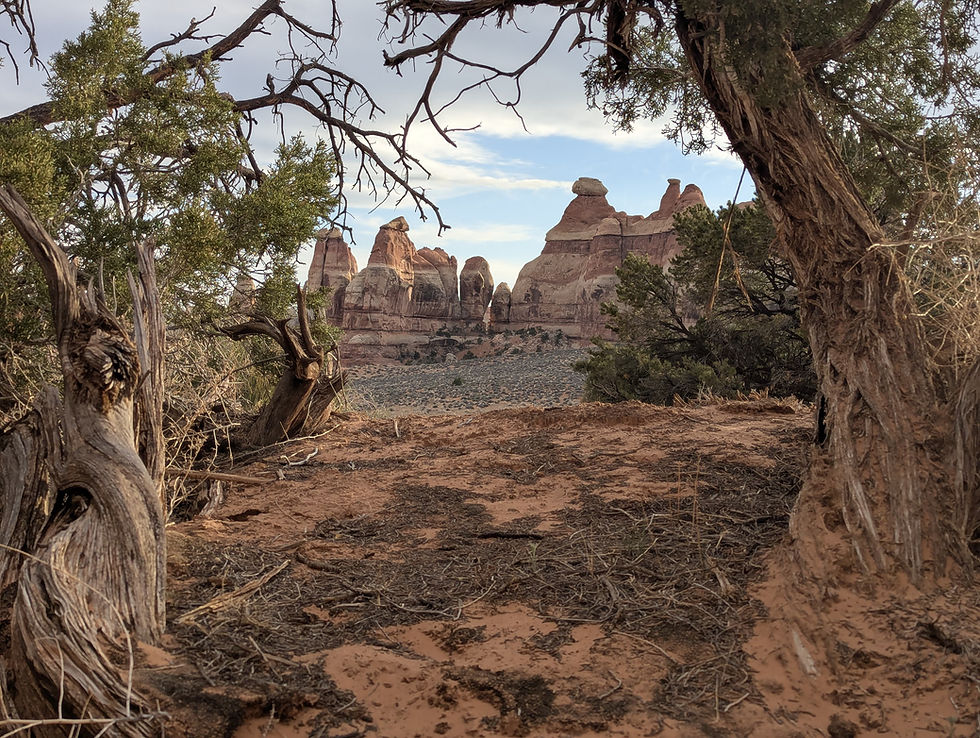13. the art of mirroring
- thompson (tbird) bishop

- Apr 16
- 4 min read
Updated: 7 days ago
I can still see them. They were sitting on the slick rock, setting sun just about to drop behind the large sandstone ridge. Below me was a pool of water on the white-slickrock–-a testament to the snows just a few days prior. They were practicing a dyadic council, listening deeply to one another and taking turns letting an attuned question emerge. Odd-numbered, I wandered out of earshot, keeping time for the community. Such a special moment of deep connection emerging all around in this wild, xeric landscape.

There is an art to how we listen to one another, to how we might open ourselves beyond interpretation and explanation and lean in to the lived experience of another. Really, this can be and has been referred to in many ways throughout human culture. For us at alchemy of prana, we know this as the art of mirroring.
Emerging as a barebone of ceremony from the early work of Steven Foster and Meredith Little, founders of both Rite of Passage, Inc. and the School of Lost Borders, mirroring serves to help empower the storyteller and midwife their experience back to their/our larger communities. Essentially, the mirror helps initiate the third phase of a rite of passage (incorporation) for the storyteller.

So what is mirroring?
To be very direct and clear, mirroring is a practice of offering reflections back to someone after they have shared a story. The context of this mirroring is important, though mirroring can be offered in a variety of contexts. Throughout our work with Alchemy of Prana, School of Lost Borders, and Rite of Passage journeys, as well as private practice, mirroring is most often held in the context of the more-than-human world and a storyteller who has just returned from some solo and intentional time exploring their inner world in relation to and in the more-than-human lifeworld.
Mirroring is not therapy, though it is often very therapeutic to be heard, felt, and seen by someone in a loving, empathic way. The mirror holds an intention to not interpret, ask questions, or continue the conversation beyond what has been offered. Rather, the mirror attunes to what has been shared by the storyteller and reflects back the essence of a part or whole of the story.
In so many ways, we are all mirrors for our loved ones, friends, and communities every day. The reason one might want to attend trainings in this art—as we have and as we just led— is to further develop and refine how we listen.

Do I listen openly, without interpretation or judgment? Can I suspend my own expectations of another and set aside my own personal and lived biases to listen with a beginner's mind?
To do this, I have found it takes practice. One of the core gifts in the mirroring trainings I have attended is the invitation to take a learning orientation, to make mistakes with one another, and thus find our own way into mirroring. We held this same orientation this past week at the art of mirroring training we hosted in Canyonlands National Park.
As a barebone of the School of Lost Borders tradition, and as students of that non-dogmatic way of enacting secular ceremony, we have been given a framework for how to navigate and practice this process. For me, no matter whether I am taking the seat as a guide or participant in this art of mirroring, I have felt steeped in a different way of knowing and loving others. I am profoundly grateful for such open, reflective, conscious, and embodied wisdom.


In preparation for this program, Colleen and I took a long walk down Salt Canyon, a multi-day backpacking trek immersing us in the sand and sandstone of the southernmost part of the park. Surrounded by ancient petroglyphs, pictographs, and dwellings of the human ancestors of this place. Walking in such a landscape, feeling the way of being called in by such a place, I could not help but mourn the loss of this way of life from much of the human world today. Such ventures past the edge of the city and deep into the heart of the wild earth are an incredible salve for the weariness of war, power-over social and cultural politics, and the general me-ness of human exceptionalism. Deep bow to all those who tend this wild earth, who strive to preserve and conserve our sacred kin and relations to this lifeworld, and also to those caught in these world systems which make invisible the true interconnectedness of each of us to our sacred, vibrant, intricate, and delicate home of Earth.
Life finds a way, again and again, in the saltiest, driest, most exacting landscapes on the planet. Can we, too, find such a way, back toward a life-sustaining culture?




Comments